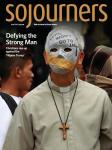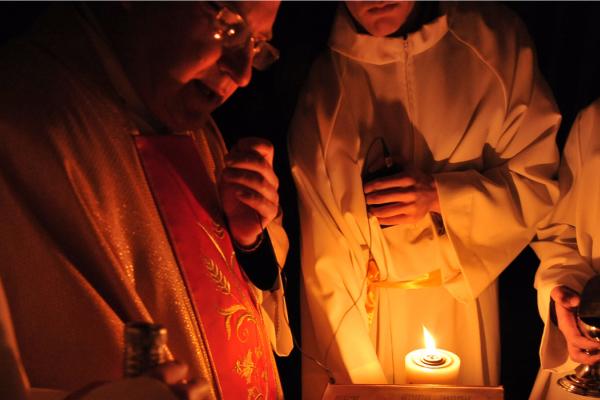FOR THE PAST three years, Pope Francis has convened leaders of grassroots movements from around the world to extend the church’s solidarity with the poor and vulnerable on three critical themes: land, work, and housing.
This winter, a regional gathering of the World Meeting of Popular Movements met in the United States for the first time. Seven hundred grassroots leaders, accompanied by 25 U.S. Catholic bishops, several international representatives, and a delegation from the Vatican, led by Cardinal Peter Turkson, met in Modesto, Calif., with the cardinal bearing a letter of support, invitation, and challenge from Pope Francis.
To the regular themes, U.S. leaders added racism and migration. Participants addressed the pain of exclusion from the perspective of undocumented domestic workers, residents of Flint whose water was contaminated, Standing Rock water protectors, and the unhoused, while also raising the hope of united, faith-rooted, nonviolent resistance.
Racial justice, in the U.S. and abroad, was a central theme. “Why is blackness a threat in America?” asked Rev. Traci Blackmon. “And how are we, as people of color, ever to be perceived as unarmed, and therefore nonthreatening, if our blackness is the weapon that you fear?” Blackmon said that oppression, dehumanization, and racism are rooted in the original sin of desiring to be God and seeking to create God in our own image. John A. Powell, director of the Haas Institute for a Fair and Inclusive Society, added, “When you ‘other’ someone in an extreme way, then you treat them as a non-human.”
Against the backdrop of President Trump’s executive orders threatening immigrants and refugees, there was vibrant energy around solidarity with these communities and resistance to the inhumane separation of families. Bishop Robert McElroy of San Diego called participants to be disrupters. “We must disrupt those who would seek to send troops into our communities to deport the undocumented, to destroy our families,” McElroy said. “We must disrupt those who portray refugees as enemies. We must disrupt those who train us to see Muslim men and women as a source of threat rather than [as] children of God.”
Meeting organizers—PICO National Network, the U.S. Conference of Catholic Bishops, and the Catholic Campaign for Human Development—worked with participants to develop a summons to action, urging every faith community “to declare themselves a sanctuary for people facing deportation and those being targeted based on religion, race, or political beliefs” and promoting statewide gatherings of grassroots movements based on the WMPM model.
Pope Francis offered a warning to those gathered—and to the rest of us. “The grave danger is to disown our neighbors ... deny their humanity and ... the most important commandments of Jesus,” the pope wrote. “The system’s gangrene cannot be whitewashed forever because sooner or later the stench becomes too strong;” it begins “to shift the responsibility for all these ills onto a ‘non-neighbor.’”
But the pope also blessed this unprecedented encounter with his hope “that the light of the love of neighbor may illuminate the Earth with its stunning brightness ... and let true humanity burst through with authentic resistance, resilience, and persistence.”

Got something to say about what you're reading? We value your feedback!

